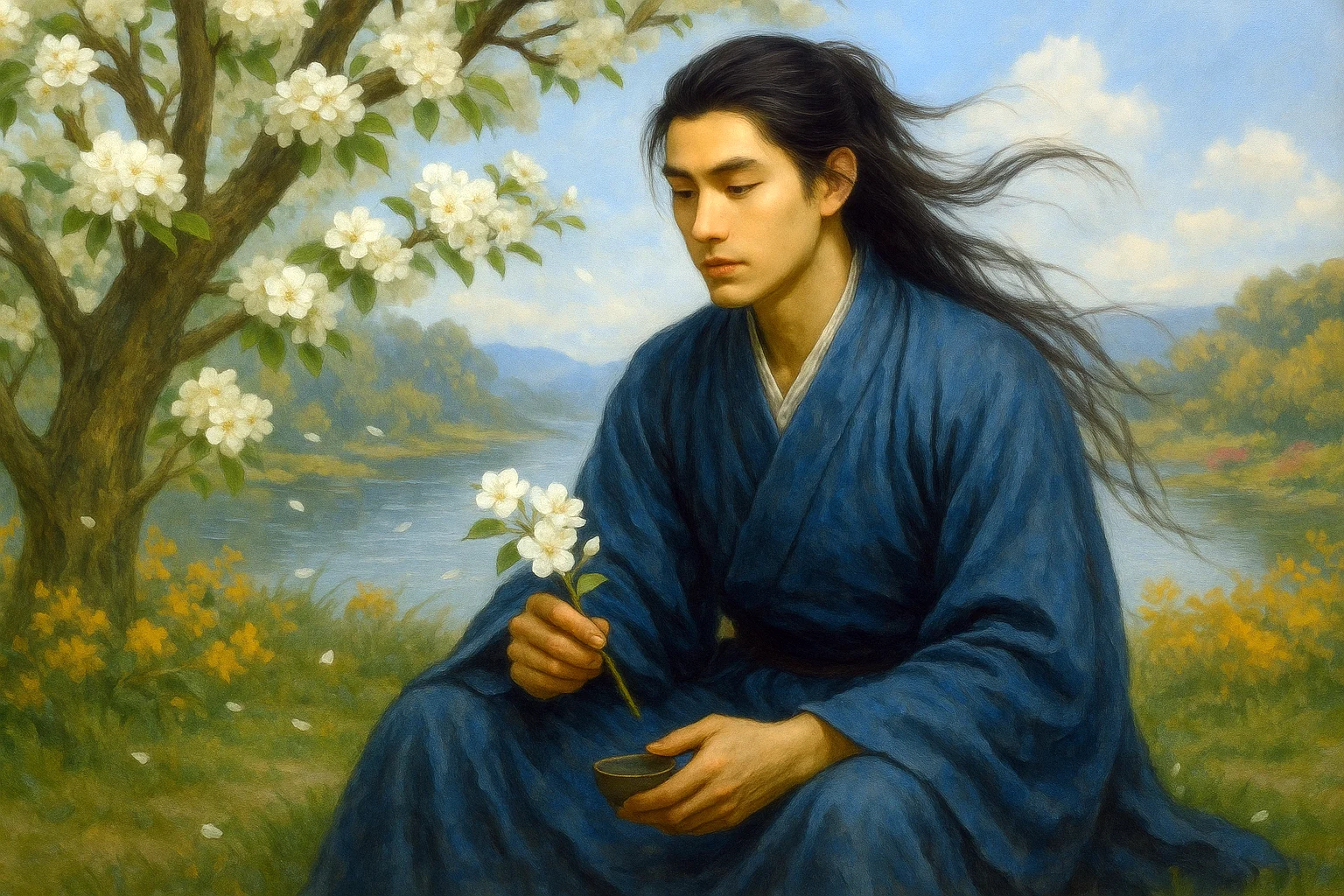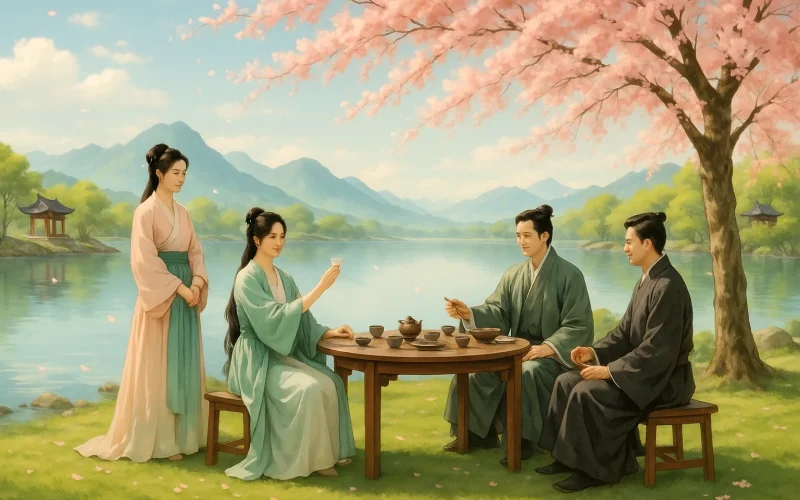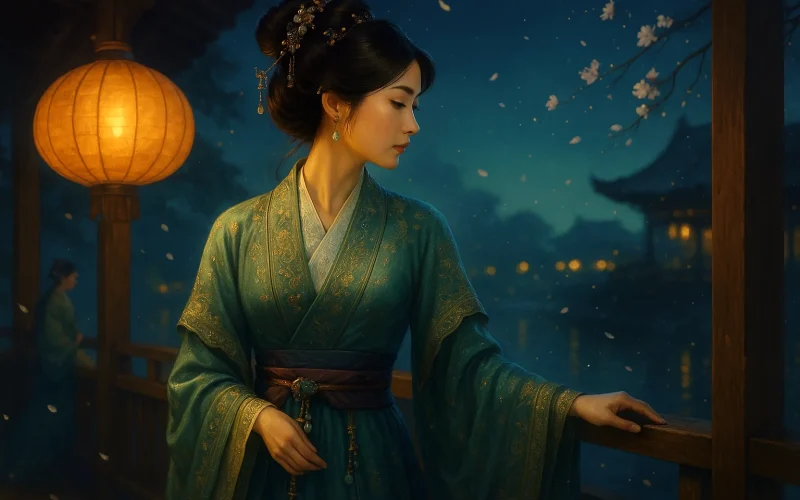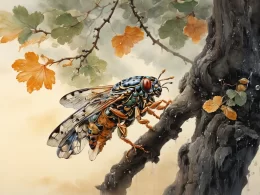Last night’s rain clears at dawn’s first call—
The empty mountain breathes crisp fall.
Two cranes descend through coiling mist,
One cicada sings where streamlets twist.
Gold blooms fade on the ancient way,
Red wildfires lick wastes of clay.
Though sickness haunts me at Maoling,
I walk with you—my heart takes wing.
Original Poem
「茂陵山行」
李端
宿雨朝来歇,空山秋气清。
盘云双鹤下,隔水一蝉鸣。
古道黄花落,平芜赤烧生。
茂陵虽有病,犹得伴君行。
Interpretation
Composed during Li Duan's later years while traveling near Maoling (present-day Xingping, Shaanxi), the burial site of Emperor Wu of Han, this poem captures a meditative autumn trek through rain-washed mountains. Though the poet alludes to physical ailment, his resolve to accompany a friend through the historic landscape reveals both quiet fortitude and the warmth of companionship. Blending crystalline nature imagery with understated emotion, the work embodies the Tang aesthetic of finding profundity in stillness.
First Couplet: "宿雨朝来歇,空山秋气清。"
Sù yǔ zhāo lái xiē, kōng shān qiū qì qīng.
Night rain ceases at dawn's approach;
Empty mountains exhale autumn's clarity.
The opening lines distill purity itself—the world rinsed clean, the very air (秋气) vibrating with cool transparency. "Empty mountains" (空山) suggest both physical solitude and a Zen-like uncluttering of the mind, establishing the poem's contemplative tone.
Second Couplet: "盘云双鹤下,隔水一蝉鸣。"
Pán yún shuāng hè xià, gé shuǐ yī chán míng.
Two cranes descend through coiling mists;
Across the stream, a lone cicada sings.
Here, nature composes its own duet: the cranes' (双鹤) graceful vertical dance contrasts with the horizontal reach of the cicada's tremolo. This interplay of height and distance, movement and sound, creates a suspended moment where landscape and psyche mirror each other.
Third Couplet: "古道黄花落,平芜赤烧生。"
Gǔ dào huáng huā luò, píng wú chì shāo shēng.
Yellow blossoms fade along the ancient path;
Scarlet fires of autumn grass flare on the plains.
Time's passage burns through the imagery—the withering flowers (黄花落) yielding to the incendiary reds (赤烧) of dry grasslands. The "ancient path" (古道) becomes a corridor through dynasties, where seasonal decay mirrors human transience. Visual heat radiates from the verse, yet carries a chilling reminder of mortality.
Fourth Couplet: "茂陵虽有病,犹得伴君行。"
Mào líng suī yǒu bìng, yóu dé bàn jūn xíng.
Though illness lingers at Maoling's gate,
I walk beside you still—and call it grace.
The conclusion transforms frailty into quiet triumph. The poet's "illness" (病) becomes incidental against the gift of shared journeying. In this historic landscape where emperors turned to dust, human companionship emerges as the true monument.
Holistic Appreciation
The poem unfolds with crystalline clarity, transitioning seamlessly from scenery to sentiment in measured, tranquil tones. It opens with the fresh clarity of a morning after rain, then shifts to ethereal images of cranes in flight and cicadas' song, before capturing the autumnal melancholy of golden wildflowers and scorched grasses along an ancient path. It culminates in the solace of companionship during an ailing journey.
This autumn trek through Maoling’s mountains is not merely a communion with nature, but a pilgrimage of body and soul. Li Duan infuses the serene landscape with his own physical frailty and profound gratitude for friendship. His spirit—neither mournful nor resentful despite illness—radiates quiet warmth. Notably, while the poem acknowledges "sickness," it avoids self-pity; though set in autumn, it resists bleak desolation. Instead, it counters the season’s austerity with lucid imagery and expansive spirit, revealing an inner calm and resilience.
Artistic Merits
The poem’s language is spare yet rich in imagery, employing a "plain-drawing" technique to depict post-rain mountain autumn with unadorned strokes. The poet excels at evoking atmosphere through natural details—paired cranes, a lone cicada, yellow blooms, charred grasses—rendering the season both crisp and vast. Structurally, the first six lines paint shifting scenes like still frames, while the final couplet anchors the emotion, ensuring the landscapes resonate with personal significance. Each couplet balances movement and stillness, light and shadow ("clearing" vs. "lingering," "descending" vs. "singing," "fallen" vs. "sprouting"), achieving both rhythmic precision and layered depth.
Insights
Even amid illness and aging, one may still find clarity, serenity, and warmth in nature and companionship. Li Duan’s poetry teaches the wisdom of "nurturing the soul through landscape"—journeying through ancient mountains to refine the heart within ordinary vistas. Facing decline and autumn’s chill, he transmutes inner turmoil not with lament, but with shared presence and self-possession. This poetic philosophy of life remains a timeless beacon for contemplation.
About the Poet

Li Duan (李端, c. 743–785), a native of Zhaoxian in Hebei Province, was among the "Ten Literary Talents of the Dali Era" during the Mid-Tang period. He excelled particularly in five-character regulated verse, crafting poetry of refined elegance and subtle nuance. His works frequently explored themes of reclusive living and the melancholy of separation, with over 250 poems preserved in the Complete Tang Poetry anthology.











